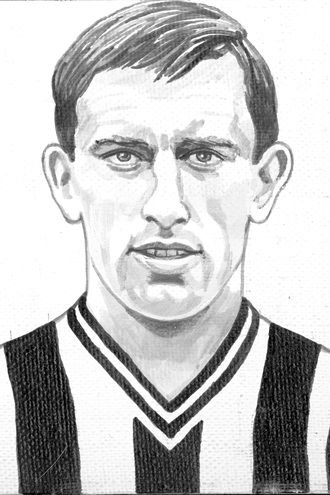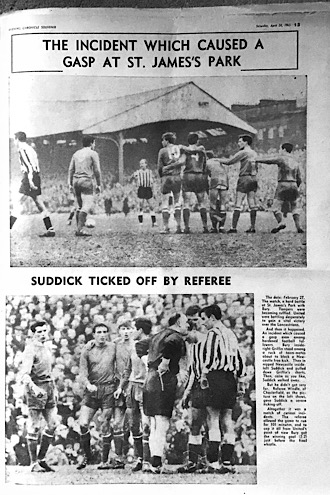

| Bth | 02/05/44 | Chester-le-Street | Co Durham |
| P/H/W | Forward | 5ft 11in | |
| Jnd | 06/60 | Ch-le-St Old Boys | |
| Pro | 10/61 | ||
| Deb | 07/10/61 | Charlton (H) | D2 |
| Dep | 21/12/66 | Blackpool | £63,000 |
| A/G | 152 | 43 |
Newcastle's history is littered with gifted but enigmatic players who have excited with their skill but sometimes frustrated with their inconsistency. Exceptional but unpredictable and able to excite and exasperate in a single run, Alan Suddick is a prime example.
Alan was born in Chester-le-Street and although his dad and all his friends were staunch Sunderland supporters Suddick junior always fancied playing for the black and whites.
He played in the same Chester Old Scholars boys team as Colin Clish and Norman "bites yer legs" Hunter. His dad recommended him to United and Sunderland and it was the Magpies scout Temple Lisle who made the first move.
He spent two years with the juniors and was then promoted to the reserves. Two games was enough to convince manager, Charlie Mitten, to promote him again.
Alan was only 17 when he made his debut in season 1961-62 and in the same season he was one of the stars of the FA Youth Cup winning side and played for England in a Youth international. A year later he played for England Under-23 against both Belgium and Yugoslavia.
Silky ball-skills, pin-point passing, perfect crossing and a raking shot which brought him a fair share of goals set him apart from most of the rest of the team at the time who had more function than flair.
Bobby Moncur was a great fan and in his autobiography "United we Stand" he stated that he had "as much natural ability as George Best" and that he could have been "not only a full international but one of the greats. He had so much ability and liked to display it like a new toy".
But as with so many of his ilk he could not always produce with the required level of consistency often tending to flit in and out of games and wander away from the core of the action. And it was often suggested that the attack was too lightweight with both Hilley and Suddick in the team.
In many ways he was a victim of one of his other great strengths; his versatility. He preferred to play inside-right, but not only was he usually asked to play on the flanks he found himself changing position on a regular basis.
The wearing of number 11, 10, 8 and 7 in consecutive matches towards the end of 1964/65 was an extreme example, but in every season he find himself shunted around.
Struggling in the 1965/66 he asked Joe Harvey if he could play at inside-forward for the reserves and scored twelve goals in ten games. This not only boosted his confidence but also won him a recall in his favoured shirt, temporarily at least. He would finish top scorer that campaign.
His impudent skills, clever footwork and lethal shooting made him a terrace favourite and when he was sold to Blackpool in December 1966 at the age of only 22 there was an outcry amongst the supporters.
If Newcastle had not been struggling to survive in the First Division and badly short of funds Suddick may have become a superstar on Tyneside; but his skills were sacrificed on the altar of footballing expediency as Harvey needed to fund new signings.
Blackpool (bottom of Division 1 and to be relegated) signed him - for a record £63,000 fee - and he stayed at Bloomfield Road for a decade where he became known simply as "The King". Even now he is rated by Tangerine supporters as one of their greatest ever players.
He was well known for his sense of humour off the pitch and in the home game against Bury in 1964/65 he showed that he was not afraid to reveal his humorous side in public. As the visitors arranged their wall for a free-kick he went around the back of them and pulled down the shorts of inside-forward Griffin.
After two years in the Juniors, Suddick was promoted to the reserves. He did so well that after only two games for the "stiffs" he was called up for the first team. He made his debut at the age of seventeen in the 4-1 home victory over Charlton and became an instant hero as he was the star in a three game run that brought three wins and sixteen goals. All his appearances were in the Number 7 shirt and critics even suggested he could be the new Bobby Mitchell. He was also one of the stars of the FA Youth Cup winning side and played for England in a Youth international.
Alan plays in three quarters of the games and shows his versatility in playing in all the forward positions except Number 9. He is rewarded with two England U23 caps in the games against Belgium and Yugoslavia (scoring once).
A repeat performance as Alan finds himself filling in right across the front line.
Wrenched his knee in pre-season friendly against Burnley and had to have a cartilage operation and misses the first couple of months of the season. but still plays a major part in United's promotion success. Most games he is played on the left flank. Culprit behind the famous Bury de-bagging.
A season of contrasts as he started on the left flank but suffered a loss of form as the team struggled to cope in the top flight and lost his place in the side. There was talk of a possible move to Middlesbrough but Harvey said he wanted him to stay.
Unhappy about not being allowed to play in his preferred inside role he asked Harvey if he will play him in this position in the reserves. Harvey agreed and after a fine goalscoring run he was recalled to the first team at inside-right. Although he was later moved back to the flank he was in inspirational form and scored 12 goals in the last 19 matches as United climbed away from trouble.
A personal highlight for Suddick - who ended up as the club's top scorer - was a brace in the 2-0 derby win over Sunderland at St James'
Suddick turned down a long-term contract in the summer as he felt humiliated that he had not been offered top terms. His genius occasionally lit up the dark days of the first half of the season but Harvey had to strengthen and had to raise funds in order to do so. With fringe players proving difficult to move on Joe took the brave and controversial decision to sell his star man with the £63,000 clawed in being used to purchase Tommy Robson, Dave Elliot and John McNamee. Alan had not wanted a move, but it was a record fee for United.
Painting by Piotr